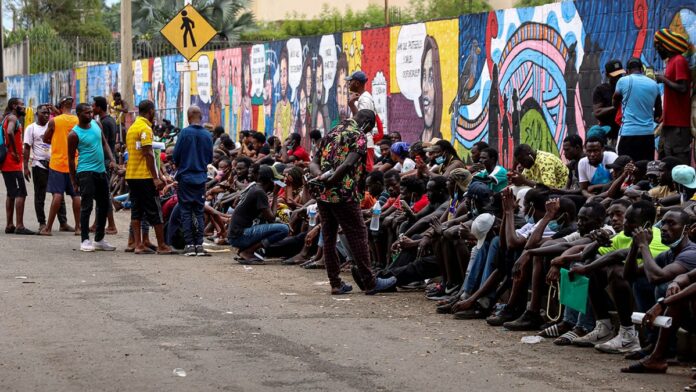By: Adama Sanneh
Migrants in the middle of their irregular migration journey say they are psychologically traumatized in their efforts to reach Europe. Many migrants hoping to go to Europe through irregular means are stuck between their country of origin and their desired destination.
While in these trapped transit destinations, mostly Libya, Tunisia, Morocco, and Mauritania, they experience economic loss and social disconnection, leaving some to wish for return and others to continue the journey despite the challenges.
According to the WHO Migration Travel and Transit 2023 report, migrants in transit are exposed to challenging and life-threatening conditions, including violence, detention, and lack of access to basic needs.
Basirou Saho, a 22-year-old migrant on the outskirts of Tunisia, recalls the challenges he faces, from frequent attacks by police and armed gangs to sleeping in desert mountains for days without access to food.
“It’s very difficult for me out here. I’m in the ‘Tepeche’ mountains. Access to food is always a problem, and my colleagues and I frequently encounter police who sometimes fire guns at us, causing serious injuries,” he stated.
He said he often falls ill without access to healthcare services. He and his friends sleep on nylon bags, which exposes them to cold and uncomfortable conditions.
These situations affect Basirou’s stay in Tunisia. However, his desire to reach Europe someday has not changed despite the psychological toll these events have inflicted on him.
Unlike Basirou, Pabi Marong, a 22-year-old migrant in Morocco, said he has not faced any physical challenges. However, the thought of raising money to continue his journey frustrates him.
“Right now, what’s always on my mind is how to raise the money to cross. It’s very expensive to pay from where I am to the island,” he added. “And that’s different from the payment for the boat. They charged me three thousand to three thousand five hundred dollars ($3000 to $3500), which is equivalent to over two hundred thousand dalasis (D200,000).”
He narrated how these figures affect him because it would be difficult to get that amount from his family, considering their financial status.
Despite the challenges and undeniable hardships on the journey, these two individuals are reluctant to give up and want to continue their irregular journey to Europe. Returning home is seen as a big failure to them.
An IOM report dated April 22, 2024, shows that the prevalence of common mental disorders such as depression, anxiety, and post-traumatic stress disorder tends to be higher among migrants and refugees than among host populations. Additionally, the International Organization for Migration reports that 65,000 to 120,000 sub-Saharan Africans enter the Maghreb yearly, with 20 to 38 percent estimated to eventually make it to Europe.
I asked Dr. Sidibeh, a psychologist, how these challenges faced in transit countries affect migrants psychologically during and after the journey.
“It can affect them psychologically, first with the anxiety of raising the money to go and what they experience on the route, from Senegal to Mali and most transit countries like Libya, Tunisia, and Morocco. The risks involved, the harassment many of them face, up to the point of death sometimes, are psychologically very impactful,” he stated. “The trauma can have a long-standing impact, leading to many psychological challenges.”
“Those who have gone through the journey and came back tell us about post-traumatic stress disorder. They remember the trauma they faced during the journey and how it affects them now. They recall events, especially gun-point situations, tortures, beatings, embezzlement of their money, and sometimes enslavement without payment, which is psychologically quite damaging. It’s a very risky journey,” Dr. Sidibeh lamented.
He advised individuals, especially young people, to stop the journey as it leads to post-traumatic stress, death, loss of money, illness, rape, and many inhumane treatments.
WHO reports show that the entire migration cycle brings changes in migrants’ physical and mental health. It may involve hygienic risks, accidents, and barriers to healthcare access. It also affects emotions, thoughts, behaviors, beliefs, and relationships with others.




